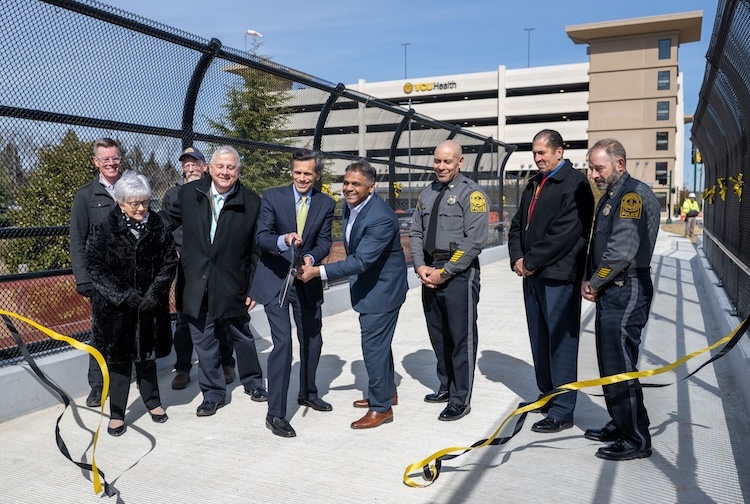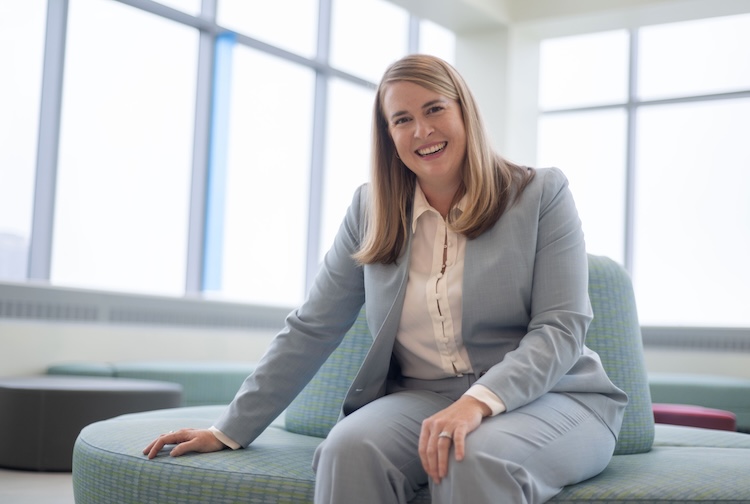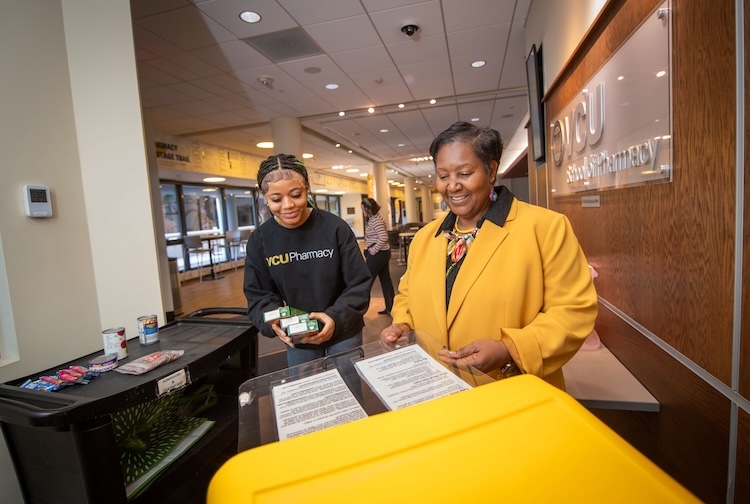The benefits of a Level I trauma center are ‘being able to have your child again,’ father says
VCU Health trauma care team and emergency responders honored for their heroic efforts to save the life of Lancaster County teen Ky Betts.
May 13, 2025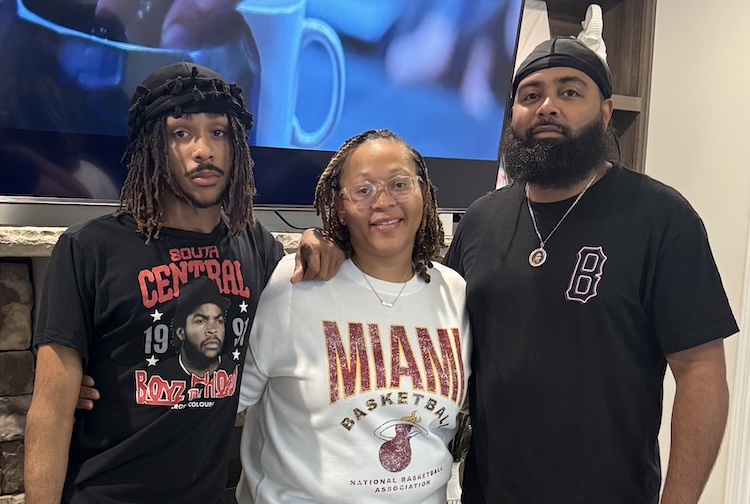 From left to right: Ky Betts with his parents, Loreese and Anthony. (Contributed photo)
From left to right: Ky Betts with his parents, Loreese and Anthony. (Contributed photo)
By Leigh Farmer
At 15 years old, Kyjeir “Ky” Betts never stopped moving. An athletic teen, whose mom Loreese Betts says “was constantly on the go.”
Case in point, on Nov. 11, 2022, Ky hopped off his Lancaster County, Virginia, school bus and immediately asked to go down the street with friends. Ky hopped in a car and off he went.
Within the hour, the driver of the car called Ky’s parents. There had been a car crash. Upon impact, Ky was ejected out of the car.
“I think I was the second or third car on the scene,” said his dad, Anthony Betts. “When I walked up, I saw the car totally destroyed.”
His son, Anthony says, was “all mangled up” in a ditch. The Lancaster County Emergency Services team arrived soon after to find Ky's leg and arm severely damaged, and his head in bad shape – from his jaw to the back of his skull.
“With the extent of his injuries we needed as many hands as we could get,” said Shane Casteel, an emergency medical technician from Lancaster County Emergency Services and one of the first responders on the scene.
The locally based VCU Health LifeEvac helicopter transportation team heard about the incident over the police scanner. From the radio transmissions alone, they knew Ky’s injuries would need the care of VCU Health’s Level I trauma center – an hour and a half from the scene. Typically, a helicopter could get them there fast. But the bad wind, rain and lightning that day made a flight impossible.
“We knew it was bad from the voices heard over the scanner. We had a quick decision to make,” said David Trueman, R.N., flight nurse for VCU Health.
Trueman and his partner Garrett Freeman, FP-C, a flight paramedic, pulled their gear out of the helicopter and threw it into an ambulance.
They arrived at the local hospital in nearby Kilmarnock where Ky had been initially taken by first responders, within minutes of his arrival.
“He was still actively hemorrhaging,” Freeman recalled. Both men knew that before they could get him into an ambulance, he needed to be stabilized enough to survive the trip. And Ky was “a very broken child,” Trueman says.
Within ten minutes, Freeman was able to control the active bleeding from Ky’s upper leg enough to allow the blood products transfused into his body to begin to stabilize the situation for transport.
“That was the first time I remember thinking we might actually have a real shot, despite the severity of his injuries,” Freeman said.
A team equipped to handle the most complex traumatic injuries
After a challenging 90-minute drive to VCU Medical Center in Richmond, Virginia, the trauma care team realized that there was still much to be done to provide Ky any chance at surviving. He had lost a lot of blood.
“Usually, we move a patient from the gurney onto the operating table, but Ky was so unstable that his blood pressure dropped and he had a massive amount of bleeding again despite holding pressure so I ended up saying ‘we just need to operate on the gurney,’” said Sayuri Jinadasa, M.D., attending trauma surgeon.
While he was more stable after that first surgery, Ky was still not out of the woods.
“I remember talking to his family and I had a really hard conversation with them,” Jinadasa said. “I said, ‘he’s okay right now but he’s really sick and he could die.’”
The benefits of a Level I trauma center are being able to have your child again. If it wasn’t for them, he wouldn’t be here.
Anthony Betts, father of VCU Health patient Ky Betts
Ky was moved to the Intensive Care Unit (ICU) in order to be monitored around the clock by nurses, intensive care doctors, trauma and orthopedic surgeons, neurosurgeons, plastic and reconstructive surgeons, and therapists – all highly trained members of the only comprehensive Level I trauma center in the region verified in adult and pediatric care. Together, they prepared Ky for the litany of surgeries to give him a fighting chance to live a normal life, including brain surgery and a life-changing leg amputation.
Doctors first addressed his brain, which had endured a hemorrhage (bleeding) and hypoxia (not enough oxygen to the brain), as well as a skull base fracture.
“There was about a week period where his brain was so unstable that going to address his leg in the operating room was impossible,” said Craig Sadler, M.D., attending trauma surgeon.
By the time he was stable enough to have leg surgery it was too late – he had developed an infection and “his leg was ultimately not salvageable”, Sadler says. The infection was beginning to cause organ failure. The team had no choice but to amputate.
“He seemed to then finally stabilize. And then that was the main point where it started to be the long road to recovery for him,” Sadler said.
Uncommon compassion positively motivates patient recovery
Recovery looks different for every patient treated at VCU Health's Level I trauma center. To get back to his life as an active high schooler, Ky would need to re-learn everything from eating and drinking on his own to walking with a new prosthetic leg.
Ky was motivated by the team around him. His parents say that he recognized the hard work being done by the medical team to return him to a normal life, so he was determined to work just as hard.
Beginning in the ICU, dietitian Laura Cutten, MS, RD, visited Ky regularly to make sure he was getting the nutrition he needed while receiving organ support with a ventilator and dialysis. Ky also spent eight weeks with speech-language pathologist Natalie Lovern, MS, CCC-SLP, CLC.
“We went from just sips of water to full-on meals,” Lovern said.
“Everything took a turn for me once he came out of the ICU. You started to see that spark of a normal kid again,” Cutten said.
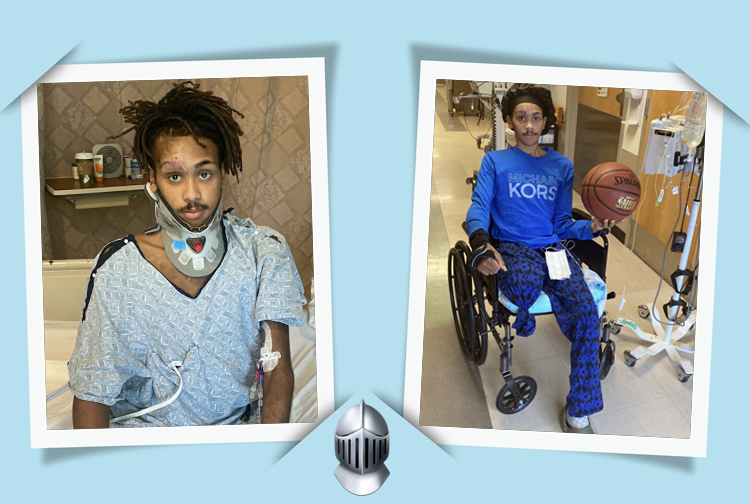
At 14 years old, Ky Betts sustained major traumatic injuries to several parts of his body after a car crash. His leg was also amputated to save his life. (Enterprise Marketing and Communications)
After spending 81 days in VCU Medical Center, Ky was discharged into Sheltering Arms Institute, a state-of-the-art rehabilitation facility in collaboration with VCU Health, that would work to ensure he had the therapy needed to function as an active teen once again.
“Our initial goals were to get him as independent as possible to go home with his parents in a safe environment,” said Berkley Ramey, MSOT, OTR/L, an occupational therapist for Sheltering Arms.
They also worked hard to get him used to his new prosthetic leg.
“I’m so proud that he not once gave up,” said his mom, Loreese. “He never had a bad day.”
Ky, now 17 years old, is back at home and becoming active in a new way: by volunteering for the Boys and Girls Club.
“The benefits of a Level I trauma center are being able to have your child again,” said his dad, Anthony. “If it wasn’t for them, he wouldn’t be here.”
Honoring those who save lives in Central Virginia
Each year, VCU Health’s Shining Knight Gala honors the emergency responders and clinicians who saved the life of a patient facing complex traumatic injuries.
This year’s Shining Knight Gala took place on May 10, 2025, and honored Ky’s trauma care team for their perseverance and dedication to his care. The gala raises money for VCU Health’s Injury and Violence Prevention Program and recognizes those who protect and save lives in the Richmond region.
Relied on regionally and respected internationally, learn about VCU Health’s Level I trauma center
Inspired by Ky’s story? Read more about our patients and providers


